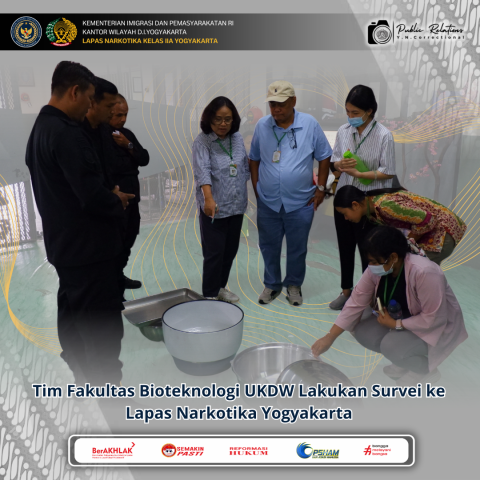As part of its commitment to enhancing self-sufficiency and well-being among inmates at Yogyakarta Class IIA Narcotics Penitentiary, the Faculty of Biotechnology at Universitas Kristen Duta Wacana (UKDW) Yogyakarta conducted a tempeh-making and food processing training program. The initiative aims to equip participants with entrepreneurial skills, helping them build sustainable livelihoods upon their release.
Held in February 2025, the training was led by UKDW Biotechnology faculty members, including Tri Yahya Budiarso, S.Si., M.P., Dr. Charis Amarantini, M.Si., Dwi Aditiyarini, S.Si., M.Biotech., M.Sc., Catarina Aprilia Ariestanti, STP, M.Sc., Dina Clarissa Kurniawan, S.T.P., M.Biotech., and Bintang Efrata Aprilia, S.Pi., M.Sc.
The program combined theoretical knowledge with practical experience, guiding participants through the entire tempeh production process—from selecting raw materials and fermentation to final packaging. Additionally, the training covered food safety, quality control, and sustainable entrepreneurship, ensuring that participants could develop marketable products.
Dwi Aditiyarini, Head of the UKDW Biology Department, emphasized the broader impact of the initiative:
“We are grateful for the opportunity to provide this training to inmates. We hope these life skills will serve as valuable tools for their reintegration into society. This initiative reflects our commitment to addressing food security challenges, promoting sustainable development, and reinforcing the strategic role of higher education in driving social well-being.”
The Head of Yogyakarta Narcotics Penitentiary, Porman Siregar, expressed his appreciation for the collaboration, highlighting the importance of skill-based rehabilitation programs:
“Training programs like this are crucial in preparing inmates for a better future. Learning to make tempeh is not just about cooking—it’s about gaining a skill that can be turned into a business opportunity.”
As part of the initiative, UKDW Biotechnology Faculty also donated tempeh-making equipment to the penitentiary, allowing participants to continue practicing their newfound skills beyond the training sessions.
By equipping inmates with practical skills and entrepreneurial insights, the program aims to motivate them toward a more productive future. The UKDW Faculty of Biotechnology remains committed to making a positive impact on society through education and training, fostering a generation of professionals who are not only skilled in biotechnology but also dedicated to social and environmental responsibility. [lia/trans.drr]
